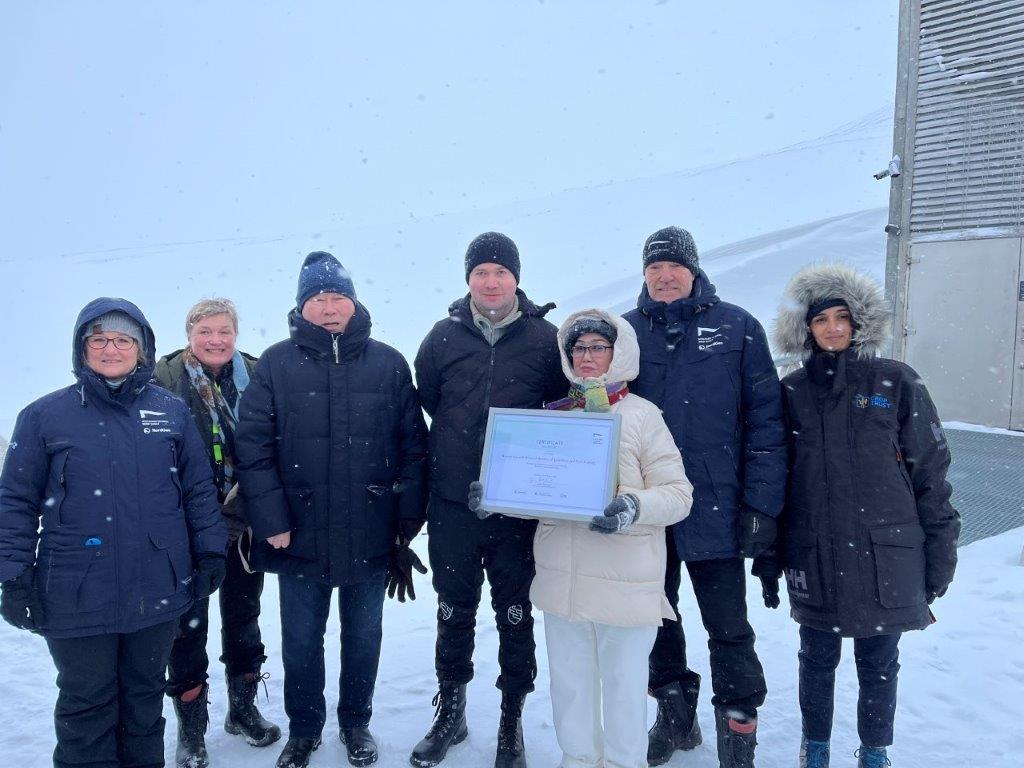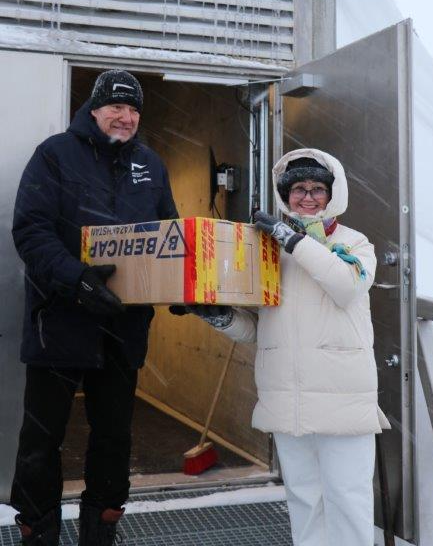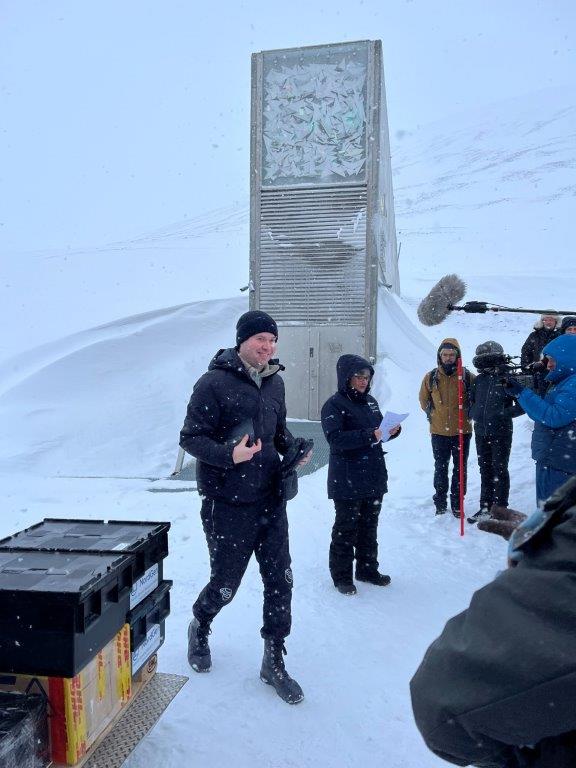Despite swirling and blowing snow on the mountainside where the seed vault is located, boxes containing more than 12,000 new seed samples safely entered the Svalbard Global Seed Vault on February 27, 2024.

Geir Pollestad, Minister of Agriculture and Food welcomed the seeds from the eight gene banks that deposited seeds for the first time and the 13 recurrent gene banks, together with representatives from the partners: Jaspreet Stamm, Director of External Affairs, CropTrust and Lise Lykke Steffensen, CEO, NordGen. Representatives from the Kazach gene bank, one of the first-time depositors, followed their box of seeds all the way from to the frozen door to the seed vault.
Eight depositors – from Bosnia and Herzegovina, Cameroon, Kazakhstan, Kenya, Madagascar, Nigeria, and Zambia – are sending their seeds for safekeeping for the first time.
Some of the more popular crops deposited this time are beans, barley, cow pea, maize, rice, millet, and sorghum. The almost 13,500 new seed samples that were delivered in February 2024 to the Seed Vault, have joined the 1,2 million samples already stored in the subterranean seed chambers at temperatures of around −18°C.

More information on the new seeds
A BOLD project partner and first-time depositor, the Kazakh Scientific Research Institute of Agriculture and Plant Growing put a particular emphasis on safeguarding seeds of alfalfa and wheat grass. “Pastures are the main source of animal feed for indigenous communities. Unfortunately, pasture species are disappearing in some places,” said Sakysh Yerzhanova, Leading Researcher of the Forage Crops Laboratory of the Kazakh institute.
The largest February deposit was made by IPK (Leibniz Institute of Plant Genetics and Crop Plant Research) in Germany. They deposited: 2,679 samples of 267 different species of crops. Mali’s Institut d’Economie Rurale was the second largest depositor, with 1,601 samples of sorghum, beans, pearl millet, fonio, millet and other crops.
The third largest deposit of 1,045 rice accessions, was sent by Madagascar’s National Center for Applied Research of Rural Development. This and 13 other deposits are made possible thanks to support from the Biodiversity for Opportunities, Livelihoods and Development (BOLD) Project, a global 10-year initiative to strengthen global food and nutrition security funded by the Government of Norway and led by the Crop Trust.
BOLD partners come from all corners of the world. The event included the first deposit of cowpea and rice from Nigeria-based Ahmadu Bello University, one of Africa’s largest and most prestigious universities. The University of Sarajevo’s Faculty of Agriculture and Food Sciences in Bosnia and Herzegovina sent seeds of maize, beans, and other crops.
A returning depositor, the Institut d’Economie Rurale (IER) of Mali, shipped seeds of African rice and fonio (Digitaria exilis), both declining crops. African rice, a local species distinct from the more familiar Asia kind, was historically neglected and forbidden to grow in commercial rice zones. It is mainly found in the inland delta of the Niger River and is highly nutritious. New, more productive varieties have been developed by crossing it with Asian rice, benefiting the people of Mali, Burkina Faso, and Niger.
New Zealand’s national forage genebank, the Margot Forde Germplasm Centre, also sent perennial ryegrass and other forage crops.
Seeds of valuable forest and forage trees from tropical, temperate and subartic climates are now stored in underground artic vaults.
African baobab and numerous types of acacias are part of the agroforestry tree seeds sent by the World Agroforestry Centre (ICRAF). Seeds of birch, pine and spruce will arrive from Skogfrøverket, the Forest Tree Seed Centre, which is responsible for conserving and managing forest tree seeds in Norway. Julius Kühn Institute from Germany is sending apple seeds.

Geir Pollestad, Minister of Agriculture and Food for Norway, said:
The Svalbard Global Seed Vault is a long-term security measure for global food security. This deposit will be the largest number of new depositors that we have ever seen. After this deposit, 111 seed banks in 77 different countries will have a backup of their seeds in Svalbard. This is not a symbolic act, it is part of the countries’ security policy, says the Norwegian Minister of Agriculture and Food Geir Pollestad.
Lise Lykke Steffensen, Executive Director of NordGen, said:
“Svalbard Global Seed Vault offers an additional, vital level of security for the world’s agricultural biodiversity, a service that is important for our global food security, especially in troubled times. It is both gratifying and hopeful that so many new genebanks around the world will participate in this seed deposit.”
Stefan Schmitz, Executive Director of the Crop Trust, said:
“One cannot describe the relief and joy we all feel as the seed boxes from all over the world arrive at the Svalbard Global Seed Vault. There is so much work behind this brief moment. The Seed Vault represents a shared commitment to global peace, where nations unite to safeguard a common resource vital for sustaining life worldwide. Preserving genetic diversity in this Arctic fastness ensures the adaptability and resilience in our crops, guaranteeing food security for generations to come.”
The Seed portal will soon be updated with the information on the newly arrived seeds:
A current list of the 22 genebank depositors who have delivered unique seed varieties to Longyearbyen can be found below:
| Seed deposits February 2024 | |||
| Depositors | Country | Accesions | Details |
| Margot Forde Germplasm Centre | New Zealand | 205 | 17 forage species, grasses and Trifolium ssp., 101 Lolium |
| World Agroforestry Centre ICRAF | Kenya | 232 | 21 sp. agroforestry tree species, 60 Acacia ssp., 46 Faidherbia |
| Institute of Biosciences and BioResources | Italy | 200 | 7 species, 194 Triticum ssp. |
| National Agricultural and Food Centre | Slovakia | 199 | 7 species, 191 wheat |
| IPK | Germany | 2679 | 267 different species |
| NordGen | Nordic countries | 1015 | 135 species, appr. 500 barley |
| Julius Kühn Institute | Germany | 5 | Fragaria and Malus |
| Skogfrøverket | Norway | 57 | Picea, Pinus, Alnus, Betula |
| BOLD partners | |||
| Kazakh Scientific Research Institute of Agriculture and Plant Growing (new) | Kazakhstan | 522 | 15 species, forage grasses and legumes |
| Fabia CSB Bogdanci (BOLD) | North-Macedonia | 197 | 18 species, vegetables, legumes, 102 Phaseolus ssp. |
| Biodiversity Education and Resource Centre (new) | Nigeria | 362 | 16 species, legumes, grains and vegetables |
| Seed Savers Network Association (new) | Kenya | 1000 | Pigeon pea, Bean, Sorghum, Finger Millet and Cowpea |
| Ecogerm Farmers (new) | Cameroon | 985 | 11 species, Zea, Solanum ssp., Amaranthus, Lycine, Talinum, Brassica, Phaseolus |
| The National Center for Applied Research on Rural Development (new) | Madagascar | 1045 | Rice |
| GRIGADEB | Benin | 779 | 13 crops, tropical grains and legumes, 241 sorghum |
| University of Sarajevo, Faculty of Agriculture and Food Sciences (new) | Bosnia & Herz. | 252 | 15 species, 93 Phaseolus, 91 Zea |
| University of Cape Coast | Ghana | 100 | Cowpea |
| Institute of Environment and Agricultural Research | Burkina Faso | 1040 | Sorghum |
| Agricultural Research Institute of Burundi | Burundi | 212 | Sorghum, beans, pearl millet, finger millet, maize, Groundnuts, pigeon pea, cowpea, okra |
| Zambia Agriculture Research Institute (new) | Zambia | 454 | 9 species: Sorghum, maize, beans of different genera, millets, etc |
| Institut d’Economie Rurale | Mali | 1601 | Sorghum, beans, pearl millet, Oryza ssp., maize, Triticum ssp., melon and fonio millet |
| Ahmadu Bello University (new) | Nigeria | 406 | Cowpea and rice |
| 13,547 |
